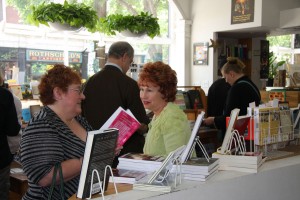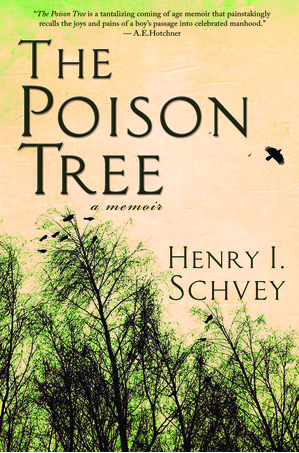Share the post "Claire Applewhite – Mystery Writer"
Claire Applewhite – Mystery Writer
by Jaime Kelley, Walrus Contributor
Local Mystery Author, Claire Applewhite, recently launched Candy Cadillac, the third book in her ‘Nam Noir Series. I had the pleasure of talking with Claire about her work and her success, and she shared some excellent pointers for writers aspiring to publish.
Thank you for taking the time to share your stories and experiences with Walrus. If you had to draw a line in the sand, when would you say you first began writing seriously or with “intent”?

Claire Applewhite at the Indie Bookstore Cruise - courtesy of her website.
There were actually two of these revelations for me. The first occurred when I went to a bookstore with the intention to purchase the review book for the CPA exam, and somehow emerged with half a dozen books on writing, especially writing the mystery. Around five years later, I went into another bookstore to buy a travel guide for Bermuda and ended up with a novel by British mystery writer, Barbara Vine, entitled The Dark-Adapted Eye. I read this novel with a fascination that I had never experienced before – I still recall the curiosity that this type of fiction existed and I hadn’t discovered it until I was well into my thirties. In both cases, mystery writing intrigued and amused me. It didn’t seem like a job to me; rather a way to have fun.
From where do you develop your characters?
I am insatiably curious about other people and their traditions. My life has been blessed with a variety of situations, people, and places, and I do no limit my outlook in any way regarding new opportunities to experience more of each. I love to travel and meet new people, eat different cuisine. I love to learn and listen to foreign language; it is intriguing to me to hear how others speak. I go for strong characteristics, both physically and psychologically to create characters who can be vividly imagined. Of course, the plots highly suggest certain types of characters. But, just as often, I will include a character that seems odd or out of place in the book, for interest.
You play with the ethnicity, socio-economic status, appearances, and station-in-life of your characters. What do these themes do for you, as writer, in the development of your stories?
My plots revolve around a central question. For example, Crazy For You examines the notion of “love at first sight”. Does it exist? The plot dissected this idea in an effort to understand the phenomena. Given the absurdity of life and the observation that the more control exerted, the less is attained, it would seem that anything is possible. Ultimately, the answer is provided by the characters.
My characters are where I have my fun. Their job is to converse with readers and other characters and do whatever it takes to illustrate the plot, and in Crazy For You they do! I did not make any effort to stifle them – their job was to entertain us, and along the way, to tell us whether or not “love at first sight” was a silly notion or a genuine phenomenon.
I understand you had some earlier, unpublished manuscripts that were mystery novels (2005, 2006). Has mystery always been your preferred genre?
I have always loved puzzles. I worked as an auditor and enjoyed finding the missing pieces to a situation. It seemed natural to me to write mysteries.
I can’t imagine you have many free moments given your publishing schedule to-date! But, in your free time, what types/genres of books do you like to read?
I like to read mysteries, of course, but I read the best sellers to see what is currently being published. I also read the classics, such as Rebecca by Daphne du Maurier.
In your Acknowledgements you often give thanks to professionals in the crime investigation field. How extensive is your research and what obstacles/challenges, if any, do you find in doing the research necessary to be able to write realistic and convincing mysteries?
For each book, the research is different, as each one deals with a new central issue. However, in a detective series, the firearms always need to be correct, and for that I visit gun stores and see, touch, and discuss the guns I use in a particular book with the people behind the counter. Incidentally, they make up some of my readership. I have attended the St. Louis county Police Academy, and interviewed snipers with PTSD. For St. Louis Hustle, I advertised in a suburban journal for anonymous stories from those who had stayed at the Coral Courts Motel. I find that most people, when they hear you’re a writer and you want authenticity in your work, are usually very cooperative, as long as you ensure their privacy.
Who is your readership?
My readership is usually adults from all walks of life who enjoy mysteries.
Do you consider readers when you are in the act of creating? Or does the story unfold and the characters take on a life of their own?
My goal is to write a good story. Period. I don’t believe a writer can write with their hands tied behind their back.
What is your writing routine? Do you set goals?
I either write very early or very late at night – 5-9am or 10pm-2am. My goal is at least 5 pages – usually 10.
Your pieces are full of real-life complex human conflicts. Do you draw from your own life experiences?
My books are almost entirely garnered from life experiences – not necessarily mine, however. I like to advertise for anonymous stories in the classifieds, which I have no trouble collecting. I did this to write St. Louis Hustle, the story set at the Coral Court Motel, a local no-tell motel.
Setting is a character. I think it’s a missed opportunity if a writer doesn’t exploit setting as a character. People who answered the classifieds had a lot to offer about their experiences and about the place itself. As for the people in my books, I take the strongest characteristics from 3-5 people I know and blend them into a new person – usually results in quite a character!
As a Communications major at St. Louis University, I wrote a short story a few months before I graduated. It concerned a medical student’s trepidation about his career choice and was entitled “On Call”. A faculty member and several classmates encouraged me to expand it into a novel, but I didn’t do it. Twenty years later, while cleaning out my files, I found that story. I re-read it, and thought, “This story might help someone else.” I began to play around with the words, and the plot and the characters. That story became The Wrong Side of Memphis, my first mystery novel, published in 2009.
The writer needs to ask and answer two questions in order to develop their characters and to show a character’s growth and change. The first is: what is the character most afraid of? Then make sure it happens to them. The second is: what does the character want more than anything? Then put obstacles in their way throughout the story – keep it just out of their reach.
What are some words of wisdom you could share with St. Louis writers who aspire to be published?
Read and write every day. Join a critique group for feedback. Start sending your work out.
You are very involved with professional writing organizations: Missouri Writer’s Guild (Past President & Board Member), Sisters in Crime, Midwest Chapter of Mystery Writers of America, etc. How important is it for beginning writers to join such groups?
You’ve got to network. You’ve got to know who’s taking what, who’s a new press, who’s looking. If people know you, you are more likely to be put onto something. If they don’t know you, they can’t call you. You can’t sit in your office and just write. As a writer, you are an entrepreneur. A lot of writers are shocked to find out that they are in business.
Read more about Claire and her work by visiting her website!


